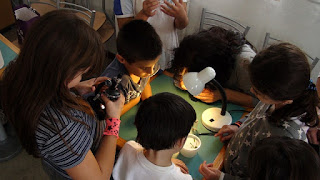How to teach kids about Science
Science education is a gradual process, and early childhood is a perfect time to begin learning science. Many parents are uncomfortable with math and science themselves, so they avoid these subjects with their kids. But don't let your own fears stop you. Teaching science to your kids doesn't have to be hard. And it can actually be fun for both of you.
Children learn best through practical, hands-on activities. You can use everyday tasks and simple projects to help your kids develop a love for science. Give them lots of opportunities to experience science in a relaxed way, through games and fun activities.
Don't expect very young children to understand and grasp difficult or abstract concepts. Focus science lessons on things kids can touch, taste, hear, see and smell. Their natural curiosity will drive them to want to learn more.
Kids love to discover new and interesting facts about the world around them. They like to ask questions about how things work. Asking questions helps them make connections between things that they have experienced in practice. You may get tired of all those questions, but try to be patient.
You should encourage these questions, even if you don't know the answers yourself. In those situations, you should not invent an explanation. Tell them "Let's find out together" and it can lead to some wonderful quality time spent with your child. Search online for answers, or take a trip to the local library. And if you don't find a satisfying answer to a particular question, then be honest about that, too. It's OK to let kids know that scientists don't know everything about how the world works, and that there are some scientific questions that still need to be answered.
When you get tired of answering questions, turn it around and ask your child some simple questions. Then, encourage their creativity by giving them an opportunity to discover the answers themselves. Asking questions also gives you a better idea about their knowledge of a topic.
How can you use everyday tasks and activities to teach kids science? Here are a few examples:
The kitchen and cooking provide many wonderful opportunities. Talk about solids, liquids and gases using water as an example. Explain freezing and boiling points. While cooking, show them how to follow a recipe and make accurate measurements. Demonstrate how yeast causes bread to rise, and the many ways cooking changes food.
Turn a light on, and explain how light bulbs work, what electricity is and how it gets to your house. While dusting and vacuuming, explain where the dust comes from. Water the plants, and explain why plants need water and light to live, and how they make oxygen for us to breathe. At the gas station, talk about how cars work and where the gas comes from.
Toys are great tools to teach kids about science. You can buy simple science toys and kits, or create your own easy science projects. Make a vinegar-baking soda "volcano." Drop a mentos candy in a diet cola. Make paper airplanes. Design a balloon "hovercraft." When toys break, let your kids open them up (under your supervision) to find out what's inside and how those toys work.
A field trip provides an excellent opportunity for science learning. Take children to a park, zoo, lake, seashore or some other place in nature. Let them get dirty, touching and exploring the environment. Point out different plants and animals, natural features of the land, cloud formations, stars and the moon, etc. Take them to one of the many wonderful hands-on science museums. Go to the library and let them browse through the children's science section for books that interest them.
There are countless teachable opportunities every day. Remember, it's OK if you don't know the answers now. Just plan ahead, and take a few minutes to look it up. Science education is very important for kids and has many benefits. They will expand their curiosity, develop a love for learning, and exercise critical thinking skills. And they will be ready for the many challenges ahead.


Comments
Post a Comment